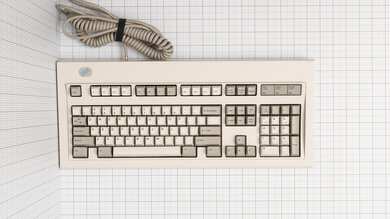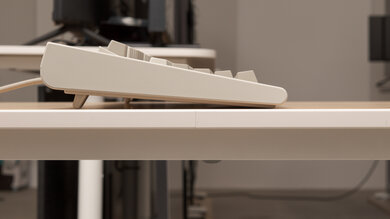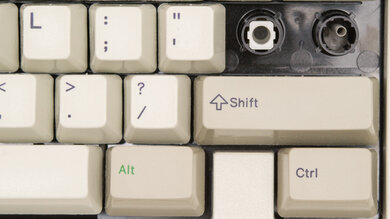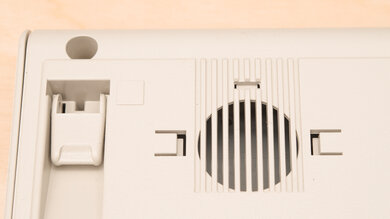The IBM Model M was once an outstanding keyboard, but technology has greatly improved and modern keyboards offer more features, like RGB backlighting or programmable keys. This vintage keyboard still offers an outstanding typing experience with unique buckling spring switches. These are different from typical mechanical switches used on modern keyboards, but they're still considered mechanical because of the mechanism used to actuate the key. If you're feeling nostalgic and just need a basic typing keyboard, it gets the job done.
Our Verdict
The IBM Model M isn't designed to be a gaming keyboard. There are no macro keys, no backlighting, and the keys have a high pre-travel distance.
- Outstanding typing experience.
- Amazing build quality.
- No extra features.
- Loud for office environment.
The IBM Model M is a good office keyboard. The typing quality is outstanding, as the buckling spring switches offer a unique typing experience. Unfortunately, it does get loud, especially for an office environment. However, it has acceptable ergonomics and it's comfortable to type on.
- Outstanding typing experience.
- Amazing build quality.
- No extra features.
- Loud for office environment.
The IBM Model M can't be used wirelessly.
The Model M is unremarkable for programming. It offers an outstanding typing experience and it's comfortable to type on. However, it doesn't have any macro keys or backlighting, and there's no dedicated software.
- Outstanding typing experience.
- Amazing build quality.
- No extra features.
- Loud for office environment.
- Outstanding typing experience.
- Amazing build quality.
- No extra features.
- Loud for office environment.
- Outstanding typing experience.
- Amazing build quality.
- No extra features.
- Loud for office environment.
Changelog
- Updated Nov 29, 2023: We've converted this review to Test Bench 1.3.1, which adds a new estimated PCB latency test to the Single-Key Latency section and a new Analog test to the Switches section of this review. You can see the full changelog here.
- Updated Oct 30, 2023: We've converted this review to Test Bench 1.3, which overhauls how key input is evaluated. We've added new tests for Single Key Latency, Multi Key Latency, Data Transmission, and Chord Split. We've also introduced a new Raw Performance usage and adjusted how the Gaming and Office usage scores are calculated. You can see the full changelog here.
- Updated Jun 21, 2023: We've converted this review to Test Bench 1.2. This update introduces new Backlight Features and Backlight Clarity test boxes. We've also added a new Switches test box, added additional test comparisons to our Hardware Customizability test box that we introduced with our last Test Bench. For an in-depth look at our changes, you can see our full changelog here.
- Updated May 26, 2023: We've converted this review to Test Bench 1.1. This update adds several new tests addressing Hardware Customization, Macro Keys And Programming, and Wireless Mobile Compatibility. We've also added new objective evaluations to the Typing Noise test, and we've simplified several tests and removed several others that were no longer relevant. For an in-depth look at all our changes, you can see our full changelog here.
Check Price
Differences Between Sizes And Variants
IBM produced many different variants of this keyboard throughout the years, with different keyboard layouts and colors, and each variant had a different Part Number (P/N). Our unit was P/N 1391401, which was manufactured in January 1993, and you can see the label here.
Popular Keyboard Comparisons
The Model M revolutionized keyboards with its layout and it set the tone for how keyboards would be designed throughout the years. However, modern keyboards also have many extra features, like backlighting, wireless connectivity, and media keys, so it's hard to compare this keyboard against those. In terms of typing quality, the Model M is still better than many keyboards today.
We also reviewed the IBM PS/2 Mouse, which doesn't compare well to modern mice and unlike the IBM keyboard, it can't really be used today. Also see our recommendations for the best keyboards, the best keyboards for writers, and the best ergonomic keyboards.
The Dygma Raise is a much better keyboard than the IBM Model M. Comparing these two is proof of just how far technology has evolved. The Dygma is a split keyboard and you can customize every key with up to 10 layers of customization. It has individually-lit keys and there are LED lights underneath it that give it an underglow. The typing quality between the two keyboards is the same, but the Model M is full-sized, so it has more keys, such as a number pad.
The Vortex Race 3 is much better than the IBM Model M. It has a better build quality, each key is macro programmable, and you can save up to four layers of customization directly to the keyboard's on-board memory. However, the Model M offers a better typing experience and it's more comfortable to type on.
The SteelSeries Apex Pro is much better than the IBM Model M. You can change the keys' pre-travel distance, it has customizable RGB lighting, all keys are macro programmable, and it has an included wrist rest. On the other hand, the IBM still has a much better typing experience.
The Corsair K95 RGB PLATINUM XT is significantly better than the IBM Model M. Each key is individually lit, all keys are macro programmable, and the comfortable wrist rest gives it better ergonomics. Meanwhile, the IBM has a better typing quality and it's fully compatible with Linux computers, while the Corsair is only partially compatible.
Test Results

Amazing build quality. It's entirely made out of plastic but it's very solid and doesn't feel like it would break if dropped. The keycaps are two separate keycaps, as seen in the photo above, and you can replace the top one in case the lettering fades off. The keys are very stable, but the space bar has a bit of wobble to it.
This keyboard has acceptable ergonomics. It has one incline setting and no wrist rest, but the entire shape of the keyboard is slightly sloped inwards, as seen in the photo above, making it comfortable to type on.
There's no backlighting on this keyboard.
The cable is coiled and when stretched out can reach over 11.8ft (3.6m). It's an SDL to PS/2 cable, so you will need a USB adapter if your computer doesn't have a PS/2 connector.
This keyboard can't be used wirelessly.
Outstanding typing quality. The buckling spring switches offer a unique typing experience with great feedback, and because the keys have good spacing and such high pre-travel distance, it helps reduce typos by quite a bit. It can get a bit tiring typing on it because of the high actuation force, but the profile of the keyboard helps reduce strain.
Due to the clicky switches, this keyboard is loud to type on and might bother people around you.
The Model M uses buckling spring switches, which have a clicky feel to them. They're slightly different from tactile mechanical switches since they don't have a bump before reaching the actuation point, but they still give tactile feedback.
Although these are technically different from typical mechanical switches used on modern keyboards, they're still considered mechanical. They use mechanical components to complete the circuit for actuation.
There's no dedicated software for this keyboard.
All default keys work on Windows and Linux. On macOS, the Scroll Lock and Pause/Break keys adjust the screen brightness if you're using an Apple display. The Print Screen key also acts as an F13 key, and the Insert key does nothing.







